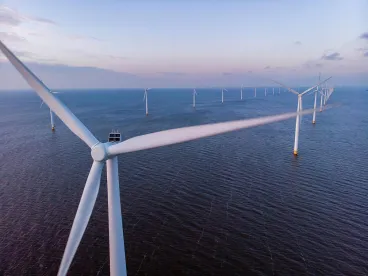Yesterday, June 23, 2022, The Biden Administration announced the launch of a Federal-State Offshore Wind Implementation Partnership (“Partnership”) to expedite and foster the growth of wind energy, tackle the climate crisis, strengthen American energy security, and achieve the goal of deploying 30 gigawatts (GW) of offshore wind by 2030.
Key parties in the Partnership include the White House National Climate Advisor, the Secretaries of the Interior, Energy, Commerce, and Transportation, in addition to the governors of Connecticut, Delaware, Maine, Maryland, Massachusetts, New Hampshire, New Jersey, New York, North Carolina, Pennsylvania, and Rhode Island. Ultimately, the Partnership hopes to expand to include governors from states that border the West Coast and the Gulf of Mexico.
With the partnership including state and federal leaders, both local and nationwide objectives and community voices will have a seat at the table. At the local level, issues such as environmental justice, workforce development, manufacturing, logistics, supply chain, and sustainability are of most concern. Meanwhile, at the federal level, leaders will balance and value states’ insights on the aforementioned topics and facilitate mandatory processes related to permitting, environmental reviews, and leasing auctions, while seeking to benefit disadvantages communities throughout the process. The Partnership also supports “an orderly and expeditious development of a robust US offshore wind industry across both fixed-bottom and floating technologies” and the “development of a domestic fleet of offshore wind installation and service vessels.”
Alongside the announcement of the Partnership, the White House is “also announcing steps to advance a National Offshore Wind Supply Chain Roadmap and designating offshore wind vessels as Vessels of National Interest to facilitate more offshore wind construction.”
The Partnership comes on the heels of several notable offshore wind developments, including Vineyard Wind and South Fork Wind, two precedent-setting, commercial-scale offshore wind projects; the US Department of the Interior’s ambitious goal of holding seven offshore wind auctions by 2025; and the New York Bight auction, which brought $4.37 billion in winning bids, among others. The reality: actual development of offshore wind energy is on the horizon, and the administration sees it as a key mechanism for its energy transition policy priorities, and for meeting the United States’ climate goals and energy security. Private sector entities directly involved in the production of turbines, towers, cables, and other integral parts in the offshore wind sector; maritime operators; and offshore business operations along the coastlines, such as lodging, transportation, fishing, tourism, and food and beverage companies should stay informed of these developments, in addition to state leaders in coastal states.




 />i
/>i

